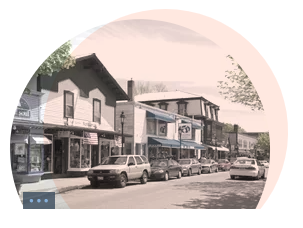在小城镇生活和工作的好处
BY PAULA PANT
 There's an often-overlooked money-saving strategy for people who like change or tend toward the adventurous, and it involves relocating to a small town.
There's an often-overlooked money-saving strategy for people who like change or tend toward the adventurous, and it involves relocating to a small town.
Everyone knows New York, Washington D.C., San Francisco, and Los Angeles carry a high cost of living. Rent in those cities is among the highest in the nation, and homeownership is out of reach for many.
The Downside of Large-City Living
You don't need to live in a major metropolitan area along one of the coasts to experience the budget-busting impact of high costs. Inland cities like Chicago, Atlanta, and Denver also have relatively high costs of living as compared to many small towns dotted across the nation's landscape.
Major cities offer many career benefits, which offer the potential to earn a higher income, but this benefit depends on your industry.
If you're a software engineer, model, dancer, journalist, or programmer, living in a major city might give you the best chance at career success. On the other hand, if you're a construction worker with a stay-at-home spouse, a small town might just be the budget-saving strategy that you need.
Benefits of Small-Town Life
Small towns have plenty of great perks of their own to offer, and you may find they're a lot more affordable than a crowded city. Here are some of the reasons why small towns are great, budget-friendly places to live:
Slower Pace: Far away from the hustle and bustle of a big city, the slower, more relaxed pace of small towns can be a welcome change.
Fewer Crowds: When you go out on a Saturday night, you won't be waiting in line 45 minutes for a table or fighting to find seats in a crowded movie theater.
Less Crime: In a small town, it's safer for kids to play outside, for bicyclists to chain their bikes in front of a coffee shop, and for you to leave your car windows cracked when you're parked in your driveway over the summer.
Lower Cost of Living: Everything from homes to groceries is cheaper in a small town. You can get an entire house for the price of a studio apartment in a large city, and with more mom-and-pop outfits than big corporate chains, the price of consumer goods is often lower, too.2 Not to mention small towns tend to have low property taxes.4
Less Traffic and Pollution: With fewer residents—and towns you can drive across from end-to-end in 10 minutes—commuting is a cinch. You'll save time and gas money, and if you're a runner or cyclist, you'll enjoy not having to jostle for space among heavy traffic.
Cleaner Air: Another side effect of fewer cars on the road is overall cleaner air, which is great because people in small towns love to enjoy the outdoors.5 (It's part of that slower pace of living.) Close-Knit Community: It's also a great chance to become a "big fish in a small pond," with less competition for jobs and more opportunity to earn a well-known reputation, you may stand out in your chosen field in a way you never could in an enormous city.
You might also find that, in addition to these benefits, small-town living reduces the amount of stress in your life. Smaller towns have less noise and business, and you'll probably have a very short commute to work. Other benefits, such as greater job security, may only exist for people in certain fields, but small-town companies often have stronger ties with their employees and turnover is less than in the "big city."